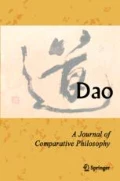Abstract
A prospective convert asked Hillel to teach him the entire Torahwhile standing on one foot. Hillel replied, “What is hateful to yourself, do not do to your fellow man. That isthe whole of Torah and the remainder is but commentary. Go and study it.” (Hillel:Shab. 31; emphasis added)
Zigong: “Is there asingle word that can serve as a guide to conduct throughout one’s life?” Confucius said: “Perhaps the word ‘shu’, ‘reciprocity’: ‘Do not do to others what you would not want others to do to you’.” (Analects: 15.24; see alsoAnalects. 12 andZhongyong. 13.3; emphasis added)1
Similar content being viewed by others
References
Allinson, Robert E. 1982. “On the Negative Version of the Golden Rule as Formulated by Confucius.”New Asia Academic Bulletin III: 223–231.
— 1985. “The Confucian Golden Rule: A Negative Formulation.”Journal of Chinese Philosophy 12: 305–315.
—. 1991. “The Ethics of Confucianism and Christianity: The Delicate Balance.” InConfucian-Christian Encounters in Historical and Contemporary Perspective, Religions in Dialogue, Vol. 5, edited by Peter K. H. Lee. Lewiston: The Edwin Mellen Press.
—. 2002.Space, Time and the Ethical Foundations. Burlington, Vermont: Ashgate.
Analects of Confucius, The. Trans. by Arthur Waley. Vintage Books, 1989.
Chan, Wing-tsit. 1955. “The Evolution of the Confucian Concept ofRen.”Philosophy East & West 4: 295–320.
-Chan, Wing-tsit. 1969.Neo-Confucianism, Etc. Hong Kong: Oriental Publications.
Cohen, Jeremy, ed. 1991.Essential Papers on Judaism and Christianity from Late Antiquity to the Reformation. New York and London: New York University Press.
Creel, H.G. 1951.Confucius, the Man & the Myth. London: Routledge & Kegan Paul, Ltd.
—. 1960.Confucius & the Chinese Way. New York: Harper & Row.
Chu, Hsi and Lu Tsu-ch’ien (compilers). 1967.Reflections on Things at Hand, The Neo-Confucian Anthology, trans. by Wing-tsit Chan. New York: Columbia University Press.
Goodman, Martin. 1995. “Proselytising in Rabbinic Judaism.” InReadings on Conversion to Judaism, edited by Lawrence J. Epstein. London and Northvale, New Jersey: Jason Aronson, Inc.
H‘Am, Ahad. 1946. “Essays.” InPhilosophia Judaica, translated by Leon Simon. East and West Library.
Hertz, J.H., ed. 1981.The Pentateuch and Haftorahs, 2nd ed. London: Soncino Press.
King, George Brockwell. 1928. “The ‘Negative’ Golden Rule.”Journal of Religion 8.
Maimonides. 1981.Commentary on Sanhedrin, translated by Fred Rosner. New York: Sepher-Hermon Press, Inc.
Munk, Rabbi Elie. 1992.The Call of the Torah, An Anthology of the Interpretation and Commentary of the Five Books of Moses, translated by E.S. Mazer, and edited by Yitzchok Kirzner. New York: Mesorah Publications.
Prager, Dennis. 1995. “Judaism Must Seek Converts.” InReadings on Conversion to Judaism, edited by Lawrence J. Epstein. London and Northvale, New Jersey: Jason Aronson, Inc.
Silver, Abba Hillel. 1956.Where Judaism Differed: An Inquiry into the Distinctiveness of Judaism. New York: The Macmillan Co.
Singer, Marcus. 1963. “The Golden Rule.”Philosophy: The Journal of the Royal Institute of Philosophy 38: 293–314.
Sforno, Obadiah ben Jacob. 1993.Commentary on the Torah, translated by Rabbi Raphael Pelcovitz. Brooklyn, New York: Mesorah Publications.
Wang, Yang-Ming. 1972.The Philosophical Letters of Wang Yang-ming, translated by Julia Ching. Columbia, South Carolina: University of South Carolina.
Weiss, Paul. 1941. “The Golden Rule.”Journal of Philosophy 38: 421–431.
Zhong Yong (the Doctrine of the Mean). InA Source Book in Chinese Philosophy, ed. by Wing-tsit Chan. Princeton: Princeton University Press, 1963.
Author information
Authors and Affiliations
Additional information
When asked what isren (humanity), on one occasion Confucius said, “Do not impose on others what you yourself do not desire” (Analects. 12.2). Sinceren arguably the most important ethical notion of Confucius and the above statement is considered to be a formulation ofren, then this statement of the Golden Rule can also be taken as the most important ethical principle of Confucius.Analects 15.24 is of special interest because Confucius, when asked for a single word, choseshu rather than evenren. Perhaps this is becauseshu is the procedural rule whereby we can becomeren and thus of the two notions the one we need the most. It is important to note here that the words are attributed to Confucius himself. See alsoAnalects 6.30 whereshu is defined as an analogy to take what is near at hand as the method ofren. To see how a similar argument can be constructed (Analects: 15:3), see Allinson 1991: 300–301
Rights and permissions
About this article
Cite this article
Allinson, R.E. Hillel and Confucius: The prescriptive formulation of the golden rule in the Jewish and Chinese Confucian ethical traditions. Dao 3, 29–41 (2003). https://doi.org/10.1007/BF02910339
Issue Date:
DOI: https://doi.org/10.1007/BF02910339




